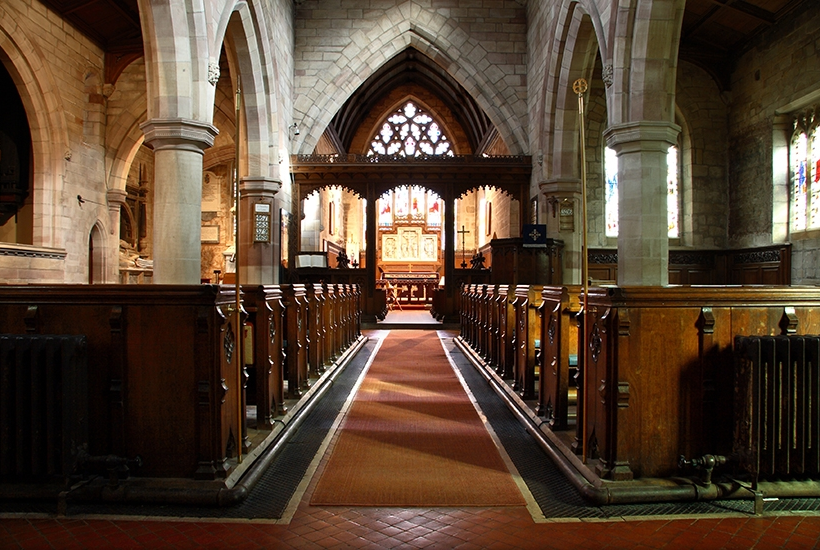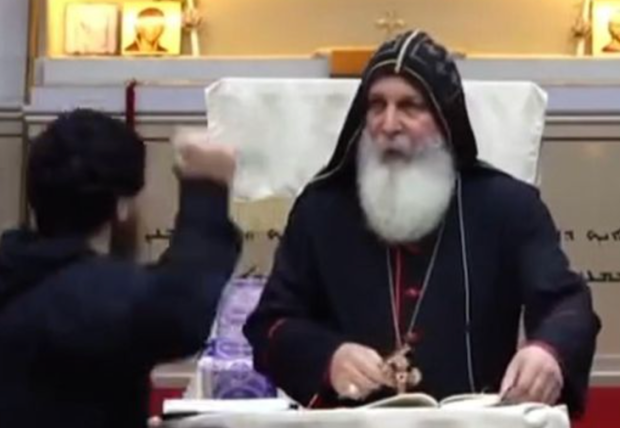The Church of England, like all churches, has always struggled with the tension between the affirmation or assimilation of culture, and the call of the gospel to confront and transform it. Its raison d’etre – its social vocation – is to mediate between the extremes. This was originally between Wittenberg and Zurich (not Wittenberg and Rome, as some believe, though it may have come to be seen as that during the 17th century as anti-Catholicism in the state was incrementally dealt with by statute, and religious liberty increased). But now the CofE’s mediating role is between scepticism and faith, between belief and doubt, pomp and satire, a longing for the sacred combined with a sense that we create the sacred for ourselves.
It does this with an unmistakable Anglican dignity, which is almost a ritualistic disposition embodying the spirit of England. Not only in the beauty and majesty of the Authorised Version, Cranmer’s Prayer Book and echoes of the XXXIX Articles, which together consecrate the ordinariness of English life. It also does so through England’s poets, painters and composers, with which and to which we still baptise our babies, join men and women in holy matrimony, and bury the dead to a solemn peal of bells.
We know it through Trollope’s Barchester and Larkin’s ‘Church Going’; through the sonnets of John Donne, the hymns of Herbert and Vaughan, and the verse of TS Eliot, Ruskin and Rosetti. It is a literary and artistic holiness which permeates the heart of England, for churchgoers who fleetingly feel the presence of God in their lives, and who, as Roger Scruton expressed it, ‘wish to be on the right side of Him with the minimum of effort.’
What we see now is a remnant of faith: chocolate-box parish churches where God lurks among polished candlesticks, marble memorials, wooden pews, and the playing of the merry organ, sweet singing in the choir. He reverberates in all His glory through the holy words of biblical English which inspire the holy thoughts of a realm beyond time and space.
People of all religions and none still flock to these places because they are sacred: the sacramental character of our national church has survived from the time when the foundations of these shrines were laid, through the storms of iconoclasm and puritanical vandalism, to the world today which is largely forgetting – or has largely forgotten – what goes on inside and what they are for. Again, Scruton expressed it well:
‘English churches tell of a people who for several centuries have preferred seriousness to doctrine, and routine to enthusiasm — people who hope for immortality but do not really expect it, except as a piece of English earth.’
Jesus said: ‘He that is not with me is against me; and he that gathereth not with me scattereth abroad.’ The Church of England says: ‘He/She that is not for me is welcome to be completely indifferent to me; and he/she that that doesn’t want to work with me can just phone when you need a christening, a wedding, a funeral, or a that bit of the Christmas you knew as a child.’
And that Christmas element is interesting: it now hangs with Remembrance Sunday and Royal weddings as a kind of secular religion. Formal state moments – funerals, coronations – are rare, but what the Church of England does annually at Christmas, in the parishes and on the BBC, is an element of civil society. People of all faiths and none find this deeply unifying, spiritually cohesive and relationally meaningful.
Even Richard Dawkins celebrates it: ‘I am perfectly happy on Christmas day to say Merry Christmas to everybody,’ he said. ‘I might sing Christmas carols – once I was privileged to be invited to Kings College, Cambridge, for their Christmas carols and loved it.’
The Church of England communicates or radiates a sacred beauty, or a beautiful sanctity
Dawkins is actually not an atheist, even though he is known as the world’s most famous one. I was present at an evening in the Sheldonian Theatre in Oxford a decade ago when he described himself as an agnostic. The Church of England would welcome him with open arms. He appreciates that it satisfies a yearning for national religious ritual to purge us of our transgressions; our inheritance of guilt and resentment. The spiritual philosophy is the seeking of common ground – reifying the parable of the Good Samaritan – humanitarian compassion; healing, reconciling, coexisting in peace and harmony above the political fray.
In those rare moments of state, it falls to the Church of England to facilitate transition. Rather like a person passes through rites of passage – birth, coming of age, marriage, death – the Church of England comforts the anxious as we move from peace to war, from queen to king, from health to sickness. Justin Welby, though, got that one badly wrong during the Covid lockdown, when, for the first time since the 14th century, England’s parish church were locked to those seeking solace and transcendental meaning. It has a uniquely pastoral role to the nation. For Richard Hooker, the architect of the reformed traditions of the English Church and what we now call ‘Anglicanism’, church and society were one.
The King was acutely involved in leading men to salvation: ‘A gross error it is, to think that regal power ought to serve for the good of the body, and not of the soul,’ he wrote, ‘for men’s temporal peace, and not for their eternal safety.’
If the state were concerned solely with the material, it would cease to be concerned with people’s welfare in respect of a right relationship with God. Hooker’s articulation of the prerogative of the Crown over its subjects’ religious welfare is the same as that which underlies the role of the Monarch in relation to the Church of England today.
In a speech in 2012, the late Queen articulated her essential Christian mission:
‘Here at Lambeth Palace we should remind ourselves of the significant position of the Church of England in our nation’s life. The concept of our established Church is occasionally misunderstood and, I believe, commonly under-appreciated. Its role is not to defend Anglicanism to the exclusion of other religions. Instead, the Church has a duty to protect the free practice of all faiths in this country.
‘It certainly provides an identity and spiritual dimension for its own many adherents. But also, gently and assuredly, the Church of England has created an environment for other faith communities and indeed people of no faith to live freely. Woven into the fabric of this country, the Church has helped to build a better society – more and more in active co-operation for the common good with those of other faiths.’
The Established Church has a missionary vocation to serve its parishioners – of all faiths and none. It doesn’t seek to exclude or to be out of sympathy with any group of people, because it has an acute pastoral concern for the spiritual wellbeing of all. The fact that its Supreme Governor is also the Head of State means that he is obliged to exercise his public ‘outward government’ in a manner which accords with the private welfare of his subjects – of whatever creed, ethnicity, sexuality or political philosophy.
The Royal Supremacy in regard to the Church of England is essentially a perpetual act of divine worship and service; the right of the Crown in its supervision and administration to provide for the religious welfare of its subjects. While theologians and politicians may argue over the manner of this ‘religious welfare’ or the precise meaning of what Hooker intended by the ‘true fulfilment’ of a ‘right relationship with God’, the focus on such issues serves to alienate and distance the Church of England from many of its parishioners. This hinders its mission in the complex context of pluralism, liberalism and secularity.
A principal tension is that we now have bishops who swear to uphold the sacred doctrine handed down to them, who then issue pamphlets and publish books which ditch Cranmer and Hooker in favour of Durkheim and Weber. They take the sociology of religion more seriously than doctrinal integrity and historical tradition, believing – in a BBC Radio ‘Thought for the Day’ kind of way – their Anglican sociology to be more in tune or more relevant to the national life. Yet they are seemingly oblivious to the spiritual yearning in moments of crisis, and the longing for meaning in human life. They boast and broadcast the virtues of food banks in churches, as though the feeding of the 5,000 were a model for the postmodern Christian mission; living by tomato soup, tinned meats and packets of pasta alone has supplanted ‘every word that proceedeth out of the mouth of God’. It is a laudable mission of welfare, but one that is almost oblivious to the reason people were originally seeking out Jesus, which was not for a bread and fish takeaway.
An important dimension of the Church of England’s core mission is the reification of the search for purity and purification in the nation – if that isn’t a metaphysical contradiction. We sin individually, and we trespass and transgress nationally. And somehow the faithful CofE helps us to purge the evils and inherited guilt of the past and create in us a clean heart, a new beginning, spiritual renewal and social peace. Its rituals may be imperfect and provisional, but it helps the whole nation, as Scruton said, ‘for a moment to stand in the light of eternity, from which we can return duly cleansed into the here and now.’
And, for all its faults, the Church of England communicates or radiates a sacred beauty, or a beautiful sanctity. We see it in everything from parish prayers, stained glass and hymns to the burial of queens and the coronation of kings. It is perpetually mediating between God and man, between Roman and Anglican Catholicism, between high and low, between American liberal and African conservative, between biblical doctrine and biblical scholarship, between secularity and spirituality, contemporary ‘relevance’ and historic patristic faithfulness, maintaining the spiritual order in the life of the individual and in the community. It provides the Eucharistic moments in the life of our nation, inculcating a common moral code – ‘British values’, if you will – with sacramental authenticity and an almost apostolic authority.
The Anglican Settlement is one of patriotic loyalty, natural morality, dignity and compromise; of a shared sense of belonging and self-understanding. It keeps the finitude of our humanity in parliamentary perspective: we are not gods, we are not immortal. There is something for us after death, and our life should be about loving and forgiving and seeking ‘the peace of God which passeth all understanding’ in a world in which so much is irrational, unintelligible and evil.
The Church of England aspires to a collaborative Christocentric synthesis in the state, if not a pacifying, postmodern, political-social-spiritual syncretism, and ‘Blessed are the peacemakers: for they shall be called the children of God.’
Merry Christmas, one and all.
This is an edited version of a lecture delivered to the Conservative Philosophy Group, founded by Roger Scruton, in Westminster earlier this month.
Got something to add? Join the discussion and comment below.
Get 10 issues for just $10
Subscribe to The Spectator Australia today for the next 10 magazine issues, plus full online access, for just $10.



















Comments
Don't miss out
Join the conversation with other Spectator Australia readers. Subscribe to leave a comment.
SUBSCRIBEAlready a subscriber? Log in